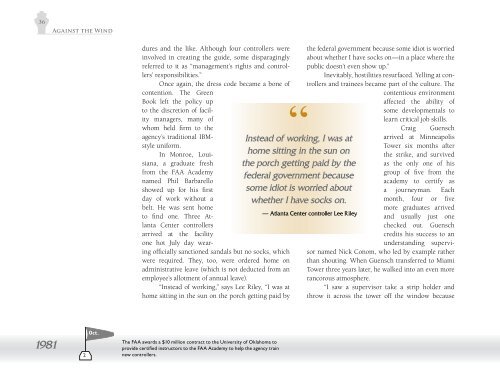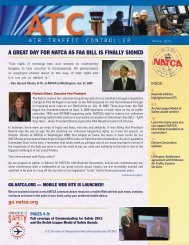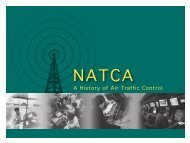Against the Wind - National Air Traffic Controllers Association
Against the Wind - National Air Traffic Controllers Association
Against the Wind - National Air Traffic Controllers Association
Create successful ePaper yourself
Turn your PDF publications into a flip-book with our unique Google optimized e-Paper software.
36<br />
1981<br />
<strong>Against</strong> <strong>the</strong> <strong>Wind</strong><br />
2<br />
Oct.<br />
dures and <strong>the</strong> like. Although four controllers were<br />
involved in creating <strong>the</strong> guide, some disparagingly<br />
referred to it as “management’s rights and controllers’<br />
responsibilities.”<br />
Once again, <strong>the</strong> dress code became a bone of<br />
contention. The Green<br />
Book left <strong>the</strong> policy up<br />
to <strong>the</strong> discretion of facility<br />
managers, many of<br />
whom held firm to <strong>the</strong><br />
agency’s traditional IBMstyle<br />
uniform.<br />
In Monroe, Louisiana,<br />
a graduate fresh<br />
from <strong>the</strong> FAA Academy<br />
named Phil Barbarello<br />
showed up for his first<br />
day of work without a<br />
belt. He was sent home<br />
to find one. Three Atlanta<br />
Center controllers<br />
arrived at <strong>the</strong> facility<br />
one hot July day wearing<br />
officially sanctioned sandals but no socks, which<br />
were required. They, too, were ordered home on<br />
administrative leave (which is not deducted from an<br />
employee’s allotment of annual leave).<br />
“Instead of working,” says Lee Riley, “I was at<br />
home sitting in <strong>the</strong> sun on <strong>the</strong> porch getting paid by<br />
The FAA awards a $10 million contract to <strong>the</strong> University of Oklahoma to<br />
provide certified instructors to <strong>the</strong> FAA Academy to help <strong>the</strong> agency train<br />
new controllers.<br />
<strong>the</strong> federal government because some idiot is worried<br />
about whe<strong>the</strong>r I have socks on—in a place where <strong>the</strong><br />
public doesn’t even show up.”<br />
Inevitably, hostilities resurfaced. Yelling at controllers<br />
and trainees became part of <strong>the</strong> culture. The<br />
contentious environment<br />
affected <strong>the</strong> ability of<br />
some developmentals to<br />
learn critical job skills.<br />
Craig Guensch<br />
“<br />
arrived at Minneapolis<br />
Tower six months after<br />
<strong>the</strong> strike, and survived<br />
as <strong>the</strong> only one of his<br />
group of five from <strong>the</strong><br />
academy to certify as<br />
a journeyman. Each<br />
month, four or five<br />
more graduates arrived<br />
and usually just one<br />
checked out. Guensch<br />
credits his success to an<br />
understanding supervisor<br />
named Nick Conom, who led by example ra<strong>the</strong>r<br />
than shouting. When Guensch transferred to Miami<br />
Tower three years later, he walked into an even more<br />
rancorous atmosphere.<br />
“I saw a supervisor take a strip holder and<br />
throw it across <strong>the</strong> tower off <strong>the</strong> window because<br />
Instead of working, I was at<br />
home sitting in <strong>the</strong> sun on<br />
<strong>the</strong> porch getting paid by <strong>the</strong><br />
federal government because<br />
some idiot is worried about<br />
whe<strong>the</strong>r I have socks on.<br />
— Atlanta Center controller Lee Riley




